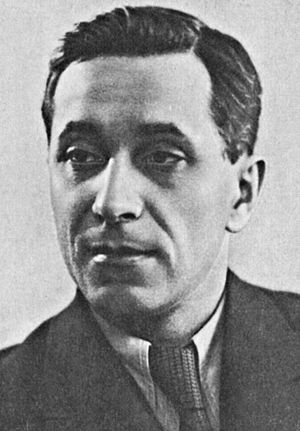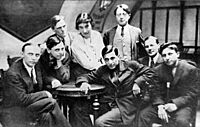Mikhail Zoshchenko facts for kids
Quick facts for kids
Mikhail Zoshchenko
|
|
|---|---|
 |
|
| Born | 10 August [O.S. 29 July] 1894 Saint Petersburg, Russian Empire |
| Died | 22 July 1958 (aged 63) Leningrad, USSR |
| Occupation | Short story writer, novelist, playwright, screenwriter |
| Education | Saint Petersburg University |
| Notable works | Youth Restored (1933) Before Sunrise (1943) |
Mikhail Mikhailovich Zoshchenko (Russian: Михаил Михайлович Зощенко; Ukrainian: Михайло Михайлович Зощенко; 10 August 1894 – 22 July 1958) was a famous Russian and Soviet writer. He was known for his funny and often sharp stories that made people think. He became very popular for his unique way of writing.
Contents
Life and Times
Mikhail Zoshchenko was born in 1894. Most sources say he was born in Saint Petersburg, Russia. His father was an artist who created mosaics. His mother was Russian.
Early Life and Education
Mikhail started studying law at Saint Petersburg University. However, he could not finish his studies. He had to leave school because his family faced money problems.
Serving His Country
During World War I, Zoshchenko joined the army. He was an officer and fought bravely. He was wounded several times and received many awards for his courage. Later, in 1919, he served in the Red Army during the Russian Civil War. He left the army after a few months because of health issues.
Becoming a Writer
Zoshchenko became a very popular writer in the 1920s. He was known for his funny stories that often made fun of society. He was part of a group of writers called the Serapion Brothers.
His Unique Writing Style
Mikhail Zoshchenko had a special way of writing. He used a simple, direct style. His sentences were short and easy to understand. He wanted his stories to be clear for everyone to read. He once said, "I write very compactly. My sentences are short. Accessible to the poor. Maybe that's the reason why I have so many readers."
Later Years and Challenges
In 1940, Zoshchenko wrote a series of short stories for children. These stories were about Vladimir Lenin. After 1946, Zoshchenko faced difficulties. The government criticized his work. This made his life very hard financially. He received a pension only a few months before he passed away in 1958.
See also
 In Spanish: Mijaíl Zóschenko para niños
In Spanish: Mijaíl Zóschenko para niños


